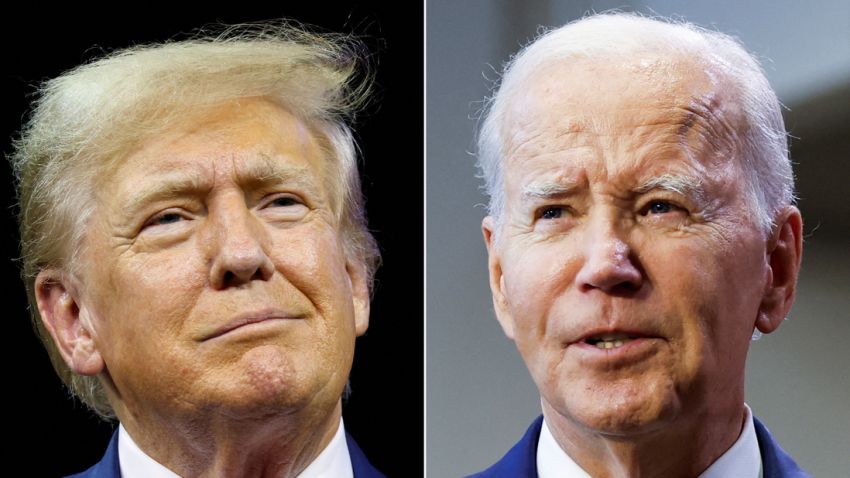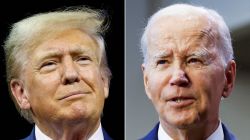Donald Trump arrives in Michigan Wednesday with a lot more support among blue collar union members than a lot of Republican presidential candidates before him. But his record as president is decidedly anti-union.
“I want a future that protects American labor, not foreign labor,” he said at a rally Wednesday in Detroit, where he opened his speech by praising blue collar workers.
But the National Labor Relations Board, which oversees labor relations at most businesses, and Trump’s court appointments, particularly to the Supreme Court, have handed unions major setbacks since he took office in 2017.
“He’s not supportive of workers’ right to organize, bargain collectively or strike,” said Cathy Creighton, an NLRB attorney during the Clinton administration and a union lawyer who now serves as the head of the Buffalo, New York office of Cornell University’s school of Industrial and Labor Relations. “Other Republican presidents said they were pro-business, or that they think labor has too much power. He tells working Americans he’s on their side when everything he did was anti-union.”
Anti-union decisions
During Trump’s term, the NLRB members he appointed made it more difficult for unions to win representation at nonunion workplaces, extending the time between when a union files for representation to when an election is held, and thus granting management more time to campaign against the union with its employees.
The Biden NLRB has rolled back those rules after they were struck down in court, and it is moving to make it easier for a union to organize.
The Trump Supreme Court also issued a devasting ruling against public sector unions, which represent almost as many union members as found at private businesses. The 2018 decision, with Justice Neil Gorsuch, a Trump appointee, providing the deciding fifth vote, makes it easier for government employees nationwide to not pay union dues even if their workplace is unionized.
Trump was famous for making promises that he would stop businesses from moving operations out of the country or shutting them down. Among his most vocal promises was that he would stop GM from closing the massive assembly plant in Lordstown, Ohio.
In a 2017 speech in nearby Youngstown, he promised residents that manufacturing jobs would be returning to the region, telling the crowd: “Don’t move. Don’t sell your house.”
But two years later GM closed the plant, despite Trump’s calls to GM CEO Mary Barra and attacks on the company’s closure plans. The company that bought the plant with plans to to eventually hire thousands of workers, Lordstown Motors, produced more losses than pickup trucks, and has already filed for bankruptcy and halted operations.
Trump promised he would impose steep tariffs on vehicles coming from Mexico, a promise he is making again now on the campaign trail. But his 2020 update of the North American Free Trade Agreement, which has long been deeply unpopular with many blue collar workers, imposed no such tariffs on vehicles coming from Mexico, and has done little to change the flow of vehicles across US borders.
While Trump says he created auto jobs and that the Biden administration is destroying them, Michigan lost 1,900 auto manufacturing jobs, or 4% of the total, between February 2017, just after Trump took office in through February 2020, just before the start of the pandemic, according to the Bureau of Labor Statistics. The state gained 1,800 auto jobs from February 2021, Biden’s first month in office, through February of this year.
Battles with the UAW
As Trump travels to Michigan in the midst of a strike by the United Auto Workers union against General Motors, Ford and Stellantis, he does so after taking shots at the union leadership conducting the strike.
He is speaking at Drake Enterprises, the non-union auto parts manufacturer in Macomb County, outside of Detroit, which is not involved in the UAW strike. A source with the UAW said it does not consider Trump’s visit to that company a sign of support for striking autoworkers, even if there are UAW members in the crowd.
Trump frequently clashed with unions when he was in business, probably more than any president before his first election. And he and UAW leadership have been taking shots at each other for some time now.
On Labor Day, as the industry was hurtling toward the union’s first simultaneous strike against all three automakers, Trump attacked both management and the union leadership for not doing more to fight the Biden administration’s efforts to promote the switch from gas-powered vehicles to electric vehicles, predicting that if that happened, the US auto industry would be wiped out.
“If the union bosses and the CEOs refuse to fight back against Crooked Joe Biden, by forcing him to repeal this disastrous electric car scheme, then you will know they’re not pro-worker, they’re not on your side, they’ve got some deals going for themselves,” he said in a recorded message.
And Trump urged UAW members to stop paying their union dues.
“You should not pay your dues because they’re selling you to hell. You’re going to be going to hell. You’re not going to have any jobs. All those cars are going to be made in China,” he said.
Meanwhile while the UAW has been critical of industry plans to convert to EVs, and has thus far withheld an endorsement for Biden, UAW President Shawn Fain has leveled his sharpest attacks at Trump. He said he has no plans to meet with him when he visits Michigan Wednesday, the day after Fain met with Biden during a visit to a GM picket line.
“I see no point in meeting with him because I don’t think the man has any bit of care about what our workers stand for, what the working class stands for,” Fain told CNN Tuesday. “He serves the billionaire class and that’s what’s wrong with our country.”
Asked if that was an endorsement of Biden, Fain replied, “It’s not an endorsement for anyone, it’s just flat-out how I view the former president.”
Rank-and-file support for Trump
Trump’s campaign staff said it doesn’t believe that the union leadership necessarily speaks for the views of rank-and-file members.
“The reality is that there’s a disconnect between the political leadership of some of the labor unions and the working middle class employees that they purport to represent,” Trump senior campaign adviser Jason Miller told CNN.
And some polls show that about 40% of autoworkers supported Trump in the last election, said Art Wheaton, the director of labor studies at Cornell University’s ILR school in Buffalo.
Wednesday night Trump told his Michigan rally that EVs would destroy the US auto industry.
“You can be loyal to American labor or loyal to environmental lunatics. You can’t be loyal to both,” he said.
Wheaton and other labor professors say that Trump’s rhetoric taking a tough line on imports or his criticism of EVs, seen as a threat to union jobs by many autoworkers, has played well with union members, even if they say his record is basically anti-union.
“You hear [that support for Trump] on picket lines. There’s quite a few who like his message,” Wheaton said.
“He really did strong comments about outsourcing of jobs and moving factories overseas,” said Todd Vachon, a professor of labor studies at Rutgers University. “We hadn’t heard that from either party before that.
And beyond issues of labor law and labor-management relations, many of the rank-and-file like Trump for other, non-labor issues.
“The people working on the floor – blue collar, average guys working hourly for the Big Three – supported Donald Trump because they have traditional values. They own guns. They don’t want their gun rights taken away or restricted. They’re predominantly anti-abortion,” said Brian Pannebecker, a staunch Trump supporter and president of Auto Workers for Trump.
– CNN’s Kristen Holmes, Alayna Treene and Daniel Strauss contributed to this report





















